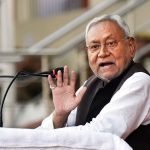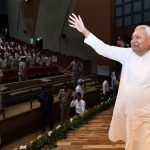Who Will Win Tata’s Trust?
Cyrus Mistry’s successor will have his work cut out for him
 Aresh Shirali
Aresh Shirali
 Aresh Shirali
|
02 Nov, 2016
Aresh Shirali
|
02 Nov, 2016
/wp-content/uploads/2016/11/Tata1.jpg)
TATA HAS LONG spelt ‘Trust’, they say; bereft of its big T, it only spells ‘rust’. That this big T is a set of values and not an individual with that name—as some suspect somebody thinks—is a point of principle the Tata Group has never been under greater pressure to affirm in its 148 years of existence. As investors and employees, institutions and politicians, corporate chiefs and citizens at large watch l’affaire Tata with dropped jaws and bated breaths, it’s also reason enough to believe that Tata Sons will take no longer than its declared four months to pick a new chief in place of Cyrus Mistry, whose October 24th ouster by its two-thirds ownership—the Tata Trusts—led by Interim Chairman Ratan Tata has put its reputation at some threat of corrosion. In his leaked letter of protest to directors, Mistry complains of not being given a ‘free hand’ to lead the Group after he took over in late 2012, alleges he was hamstrung by ‘legacy hotspots’ left by lousy deals that would severely erode its overall financial worth, and hints of funds embezzled and dud loans extended here and there. In response, Tata Sons has flayed what it calls ‘malicious allegations’ made by an ex-chief who’d failed to address a ‘growing trust deficit’ with trustees.
So far, so gulp worthy. If the four-month promise is a must-fulfill for Tata Sons, what deficiency its next chief—and a hot seat doesn’t get any hotter than this—would be expected to fix is also beyond doubt. Yes, that dull but dare-one-say ‘dharmic’ word, trust. And not just in trustee perception, but everyone else’s too.
It has been the Group’s success formula, in a way, ever since its founder Jamsetji Tata caught the attention of London investors in the mid-1860s with his frank admission that the family business shares he was in town to sell had turned worthless, given that a cotton bubble inflated by the US Civil War had burst almost as soon as he got off the ship. The founder’s ‘straightforward business principles’ went well with his social ideals and have been echoed by every Tata chief down the decades. ‘I have often come to the conclusion that if we were like other groups, we would be twice as big as we are today,’ wrote JRD Tata, who’d been the main author of the 1945 ‘Bombay Plan’ that called for a mixed economy, at the fag end of his long tenure on top. ‘What we have sacrificed is a 100 per cent growth, but we wouldn’t want it any other way,’ he made plain. His successor Ratan Tata, who took over just as India opened up in 1991, had this to say: ‘We want our managers and companies to drive their businesses using every means they can to achieve their ends, but they must do it in a way which stands out and continues the traditions that the group has established over the years.’ ‘You have aberrations from time to time,’ he added, ‘There is no perfect world. It is how we react to those aberrations and how we overcome those issues that will set us apart from the rest.’ The big crisis of his tenure was the 2001 scandal at Tata Finance, a subsidiary of which was found by an internal probe to have diverted funds to entities up to no good. Its managing director wasn’t just sacked but also charged legally with fraud. In 2007, Tata Capital took its place as the Group’s main financial firm.
Just keeping watch of all that goes on in every nook and cranny of a $104-billion conglomerate could boggle even the omniscient. At last count, Tata had over 660,000 employees on its rolls at 100 companies operating in six continents. And then there’s also performance to worry about, the stuff of numbers that could crash a supercomputer with all its complexity. Broadly, what’s known is this: barring Tata Motors’ JLR division and software major TCS, which keeps the Group flush with funds, almost all its businesses are in bad shape. Of the firms whose stocks are publicly traded, a majority earn less than they would if they’d loaned the same money to somebody else. And the ‘hotspots’ are hot indeed. What’s unknown is what it would take to craft a revival plan.
It’s an unenviable job, but somebody’s got to do it.
Who could it be?
“The best group chiefs are those who are able to balance inherent conflicts between investors and other stakeholders such as suppliers, employees, customers and the community,” says Professor Jagdish N Sheth, Charles H Kellstadt Professor of Marketing at the Goizueta Business School of Emory University, Atlanta, US. “In other words, someone who is able to create non-zero-sum value and a win-win by refusing to accept trade-offs as a way to manage the enterprise.” The other leadership competence he outlines is an ability to ‘manage public policy’. By this, he means “understanding that ultimately, it is about ‘doing well by doing good’, especially in the age of social media acrimony”. “Creating shared value for both private gain and public interest is the only way to assure perpetuity of an institution,” he says.
Business historian Morgen Witzel, author of Tata: Evolution of a Corporate Brand, holds three selection criteria aloft: “He or she must first of all uphold the values of the Group, and be seen to uphold them. During his own tenure as chairman, Ratan Tata was very much a flag-bearer of those values, in the same way that JRD and Jamsetji Tata were. Second, he or she must articulate a clear strategic vision that all can share, and that vision must show how the Group will go forward. Clear communication skills and a lot of courage will be required. Third, the new leader must be visible and demonstrate trust. After the events of the past week, the new leader will be scrutinised very closely and people will be watching for signs that he or she has a firm hand on the tiller and is ready to guide the group forward.”
Prithvi Haldea, founder chairman of Prime Database, an equity data cruncher, believes that the Group must already have had someone in mind, given the “premeditated” nature of the action taken against Mistry. “It will be somebody who’s known to the family and has a track record of performance,” he expects, “They’d want someone who delivers on performance, ethics, brand values, etcetera, and who is also consistently on the same wavelength as the owners.”
And owners, Haldea points out, do have the right to retake control of their firms. “Professional managers are always at the mercy of owners, and though [Mistry] represented the second biggest shareholder, he was not the [principal one],” he says. “Owners don’t want to be snubbed often. Even if they’ve taken a backseat, remember, they’ve not taken sanyaas.” Also, technically, it was the Board of Tata Sons that voted Mistry out. “Boards fire executives all the time; there is nothing new about that,” says Witzel, a fellow at the Centre for Leadership Studies at University of Exeter Business School, “When an executive loses the trust of the board, or when there is a major disagreement about strategic direction, then the executive has to go. That is clearly what has happened in this case.”
In business guru Jagdish Sheth’s view, it was a clash of cultures. Shareholder value oriented Cyrus Mistry inherited a culture that prides itself in stakeholder welfare
In such a scenario, an outsider would find the going especially hard, would s/he not? Haldea agrees, saying it’s always easier for someone steeped in the company culture to lead it. Consider Professor Sheth’s first reaction to the news of Mistry’s ouster: “It was disbelief followed by an explanation from other companies about how antibodies take over when an outsider comes into a well-established organisation. This was the case at IBM, AT&T, Hewlett-Packard and also in some Indian enterprises. My book Self Destructive Habits of Good Companies articulates this point.” The usual Indian way to resolve this, he adds, is to have a company’s chairperson represent ownership and a professional CEO lead the business. The Tata Group, in his view, saw a “clear clash of shareholder and stakeholder cultures”. He explains, “Mistry came with a very successful career in increasing shareholder value and inherited a culture that prides itself in stakeholder welfare, including the community, employees and, to some extent, suppliers.” In Firms of Endearment, Professor Sheth and his co-authors Rajendra Sisodia and David Wolfe argue that the broader approach eventually works out better even for shareholders focused only on their own wealth.
Even hardnosed equity analysts, says Haldea, recognise that long-term success isn’t about Dalal Street’s ticker tape readings. “Markets want it all,” he says, “They want high profits and high ethics. They know that the means are also important, not just the end.”
From that very vantage point, though, isn’t the Tata Group in a crisis right now?
“Not if it is handled swiftly and promptly, no,” says Witzel, “Markets don’t like uncertainty, but the swift appointment of a new leader will do much to allay market fears. The new leader will, of course, have to prove that he or she respects the group’s values and reputation and will work hard to strengthen the brand.”
Professor Sheth puts it in perspective. “Any change in culture implies reputation risk,” he says, “However, it is often short-term and the organisation tends to be resilient enough to survive and re-establish itself, unless it is shut down or severely penalised by regulators as in some cases during the Great Recession of 2008-09.” What must not daunt an incoming Tata chief, he believes, is the oft-made argument that the Group is much too sprawled out to manage. “Diversified conglomerates are not as unwieldy to manage as we think,” he says, citing successes among other business groups in India as well as in Mexico, Brazil and Indonesia. “What is unwieldy to manage is the community of investors, who want a focused global enterprise so that they can identify where to position the company as they design their portfolio for large institutional investors.”
MEANWHILE, SPECULATION IS in the throes of a bull run over who’ll eventually get the job that the 79-year-old Tata patriarch has reclaimed from a man 31 years younger. Among family members, the obvious pick would be Noel Tata, Ratan’s half brother who missed out five years ago. Apart from Tata International, he runs the Group’s retail company Trent, which has done rather well since the time he was passed over; it has enhanced profits without splurging cash with its lossless-if-slow strategy of expansion, and while Westside boasts of a fine feel of the consumer pulse, alliances with Zara and Tesco have held steady too. At 59, Noel Tata has age on his side. He also happens to be Mistry’s brother-in-law, married as he is to the ousted chief’s sister, Aloo, a factor that may either play spoiler—given the acrimony—or offer them something of a chance to make up. The Mistry family owns just over 18 per cent of Tata Sons, and it’s unclear if Tata’s reported plan to buy them out of their stake will come to anything (it has been tried before).
An insider who’s six years away from the Group’s retirement age for chairmen but could still make it, say sources, is the 69-year- old Ishaat Hussain, Tata Sons’ finance ace who was credited with keeping the fallout of the Tata Finance meltdown from getting too far. ‘Grime and Salvation’, his report on the disaster, is held up as a smell-the-coffee read by many of the old guard who place a premium on accountability. If the big T needs to be chrome plated, goes this line of reasoning, Hussain is perhaps the man for it.
To ward off reputational risk, warns Tata historian Morgen Witzel, the Group must ensure there is no prolonged delay in the appointment of a new chairperson
Another probable is said to be Bhaskar Bhat, managing director of Titan Industries, an IIT-Madras and IIM-Ahmedabad graduate who has been with the group since 1983 and was appointed chairman of Vistara, Tata’s aviation joint venture with Singapore Airlines, earlier this year. Having worked closely with Xerxes Desai in setting up a watch company that saw itself as a fashion play, he is considered a business creator with a sharp consumer focus. The success of Tanishq as a trust-mark is said to bear his imprint, and at 62, he has more than a decade ahead of him.
Market watchers are especially bullish on the two additional directors appointed to the Board of Tata Sons the day after Mistry was voted out as chairman. The less familiar of them is Ralf Speth, the 61-year-old CEO of Jaguar Land Rover (JLR) who has revived and turbo-charged this business so splendidly since he took over in 2010 that its profits justify the 2008 acquisition many times over. An engineer by education, he spent about 20 years of his career with BMW before joining Ford, from which Tata Motors bought JLR. He is reputed to combine a passion for cars with one for his adopted corporate culture.
Most eyes, though, are on the other man inducted by the Board on October 25th: Natarajan Chandrasekaran, the rock-star CEO of TCS whose credentials as a performer are clear in any indicator you pick at random. Without this company’s blistering billions, the Group would’ve been staring at oblivion. Chandra, as he’s fondly called, is a career Tata man, having joined TCS in 1987 right after a Master’s in Computer Applications from Regional Engineering College, Trichy. By 2009, he was the boss. Since TCS has a wide range of global clients in multiple fields, his exposure to diverse business challenges is assured. As far as anyone can tell, his relationship with the Trusts has always been cordial, and for a group that likes its chief to envision and execute plans going far into the future, his age seems perfect. Chandra is just 53.
By virtue of similar proficiency, also in contention could well be S Ramadorai, the former CEO of TCS who recently resigned as chairman of the Government’s skill development agencies. Has he had his shoulder tapped? A career Tata man, he is chairman of Air Asia India, the Group’s other aviation alliance. He is 71, though.
They’re all Tata people. But then, that’s not a criterion set in stone. It could yet be a surprise choice, for all one knows, a contender nobody saw as one except those trusted not to breathe a word of it, least of all to pesky journalists. Almost a week’s effort to obtain an authentic shortlist has yielded nothing. If Mistry’s ejection was kept confidential till the nth hour, so might this be. ‘I am looking forward with equal excitement to the finalisation by a selection committee of a world-class leader to be the new chairman of the group,’ is what Ratan Tata has conveyed to employees.
Whoever it is, a name needs to be declared fast. What sets Tata apart is its “strong set of values” as Witzel puts it, values that its leadership must ‘fervently’ uphold. Tata has kept its lustre for about a century-and-a-half. “Damage might come,” he warns, “if there is a lengthy delay in finding a new leader.” What’s at stake here is trust—with its big T intact.
About The Author
CURRENT ISSUE
MOst Popular
3

/wp-content/uploads/2025/07/Cover_Crashcause.jpg)













More Columns
Bihar: On the Road to Progress Open Avenues
The Bihar Model: Balancing Governance, Growth and Inclusion Open Avenues
Caution: Contents May Be Delicious V Shoba